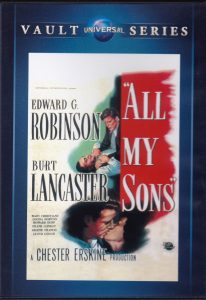Arthur Miller’s first hit play was All My Sons which is about divided loyalties after WW II in America. Joe Keller has made a successful business, but during the war, he okayed a shipment of cracked cylinder heads for fighter planes that led to the deaths of 21 men. Though tried in court, he was exonerated when he denied responsibility and let his partner take the fall.
Chris Keller, one of his two sons, is working for the business and stands to inherit the factory, but secrets eventually come out after he brings Ann Deever home (the daughter of the partner and fiance of his brother, a pilot who mysteriously died in the war).
Chris’s mother is in denial about her older son’s death until Ann tells her the truth, something she passes on to Chris, who, similarly enlightens the father, ultimately. Chris is an idealist who worships his father, but, after he visits the partner in jail, his loyalty to his brother and the men he fought with eventually decides the fate of his relationship with his father and Ann.
The casting in the movie is perfect with Edward G. Robinson as Joe in one of his most dramatic roles. A young Burt Lancaster fits well the idealistic Chris part. The mother and Ann are, likewise, well-acted by Mady Christians and Louisa Horton.
Producer Chester Erskine produced the play and did the script adaptation, using much of Miller’s original dialogue. He ‘opens up’ the play with outdoor, factory, house, and yard scenes, befitting a movie. One major change to the original involves Chris going to see the partner in jail for confirmation of his suspicions about his father’s guilt and a flashback to the actual crime.
There is so much moral conflict in the play which is accentuated by the father and mother’s lies, a drunk woman who breaks up the family dinner in a restaurant (another added scene), and the turning point of George’s, Ann’s brother’s, visit to the Kellers in the middle of the movie.
Miller’s play makes the point, oft-made, that those who stayed at home got rich on the war, often without any moral conscience. He shows, too, that the conflicts of wartime seriously affected family life during and after the war. Truth vs. illusion is a common Miller motif in his work and frequently, the results are hard-hitting and memorable like this play and movie. Miller wrote intense, intelligent plays and serious dramas like All My Sons for the rest of his career.
This movie version is a reasonable facsimile of the play and gets the average moviegoer to reflect about existential choices that affect/ed us all. An oldie but goldie, for sure.

